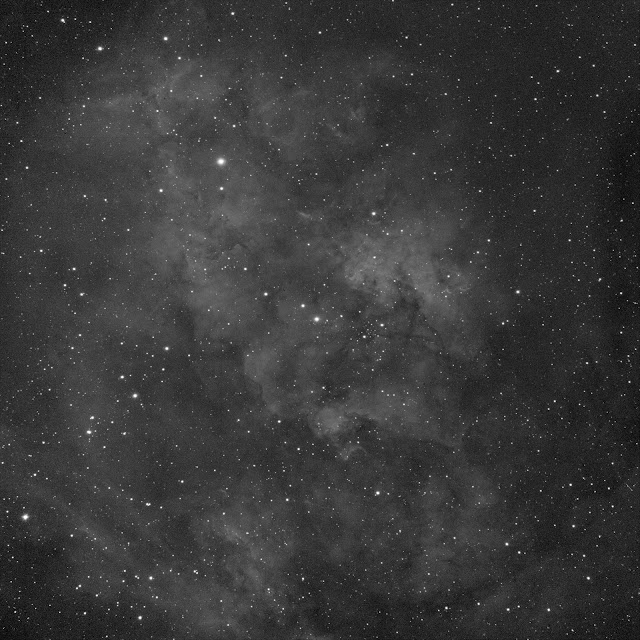COPYRIGHT, PLEASE NOTE
All the material on this website is copyrighted to J-P Metsavainio, if not otherwise stated. Any content on this website may not be reproduced without the author’s permission.
BUY A MUSEUM QUALITY POSTER
BUY A POSTER:https://astroanarchy.zenfolio.com/
Sunday, December 15, 2024
New Photo, Sharpless 115 in Cygnus
This Portion of sky covers less than a square degrees of sky in Constellation Cygnus, the Swan.
This star nursery has always looked to me like like it was cut out of the Baroque painting.
I was able to shoot a high resolution data for it with my new imaging setup. The Celestron Edge 14". This telescope has a beautiful optics and with a secondary mirror focuser, it'll hold the collimation perfectly all the time. Normally the heavy main mirror is used for focusing and it can be source of optical problems when it moves due to gravity when the scope is moving and pointing to a different portions of sky.
BAROQUE SKY OF SHARPLESS 115
Click for a full size photo, 2000x2000 pixels
A mapped color image from a light emitted by an ionized elements,
sulfur=red, hydrogen=green and oxygen=blue
sulfur=red, hydrogen=green and oxygen=blue
200% Enlarged Portion of the Full Resolution Photo
Click for a full size, 2000x2000 pixels
INFO
Sharpless 115 stands just north and west of Deneb, the alpha star of Cygnus, the Swan, in planet Earth's skies. Noted in the 1959 catalog by astronomer Stewart Sharpless (as Sh2-115) the faint but lovely emission nebula lies along the edge of one of the outer Milky Way's giant molecular clouds, about 7,500 light-years away.
Shining with the light of ionized atoms of hydrogen, sulfur, and oxygen in this Hubble palette color composite image, the nebular glow is powered by hot stars in star cluster Berkeley 90. The cluster stars are likely only 100 million years old or so and are still embedded in Sharpless 115. But the stars' strong winds and radiation have cleared away much of their dusty, natal cloud. At the emission nebula's estimated distance, this cosmic close-up spans just under 100 light-years.
Source: NASA APOD
Shining with the light of ionized atoms of hydrogen, sulfur, and oxygen in this Hubble palette color composite image, the nebular glow is powered by hot stars in star cluster Berkeley 90. The cluster stars are likely only 100 million years old or so and are still embedded in Sharpless 115. But the stars' strong winds and radiation have cleared away much of their dusty, natal cloud. At the emission nebula's estimated distance, this cosmic close-up spans just under 100 light-years.
Source: NASA APOD
Sharpless 115 in visual colors
Click for a full size photo, 2000x2000 pixels
sulfur=red, hydrogen=red and oxygen=blue, this combination is very close to a natural color palette.
Sh2-115 in a large context
Please, click for a large image, NOTE. 4000x5000 pixels
Sharpless 155 is marked with a white rectangle at lower left.
This is my very large mosaic photo of the whole Cygnus, more info about this massive photo
This is my very large mosaic photo of the whole Cygnus, more info about this massive photo
can be seen in this blog post, https://astroanarchy.blogspot.com/2021/12/cygnus-mosaic-gets-large.html
Technical details
Processing workflow
Image acquisition, MaximDL v5.07.
Stacked and calibrated in CCDStack2.
Deconvolution with a CCDStack2 Positive Constraint, 27 iterations, added at 50% weight
Color combine in PS CS3
Levels and curves in PS CS3.
Imaging optics,
Celestron EDGE 14" with 0.7 Focal reducer
Mount,
MesuMount Mark II
Cameras,
Imaging camera Apogee Alta U9000M and Apogee seven slot filter wheel
Guider camera, Lodestar x 2 and SXV-AO Active Optics @ 5hz
filters,
Astrodon 5nm H-alpha, 3nm S-II and 3nm O-III
Total exposure time 12h
H-alpha, 18 x 1200 s, binned 1x1 = 6 h
O-III,9x 1200 s, binned 2x2 = 3h
S-II, 9 x 1200 s. binned 2x2 = 3h
A single calibrated 20 min exposure of H-alpha, Bin 1x1
Click for a full size image.
Labels:
EDGE 14",
Narrowband color images,
nebula
Subscribe to:
Post Comments (Atom)














No comments:
Post a Comment